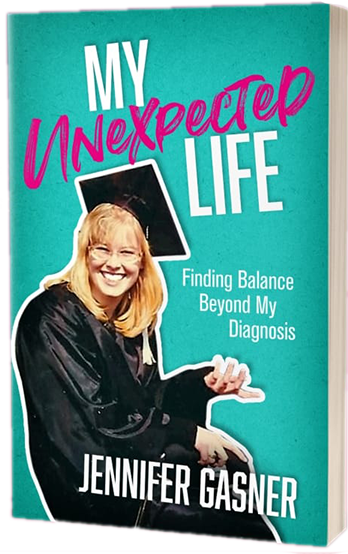No, I’m not referring to lanky men or women sitting in their wheelchairs looking alluring in an advertisement for Tammy Hillfiger’s adaptive, clothing line. I am referring to three basic ways to look at disability. The medical model, the charity model, and the social model.
First, let’s look at the medical model. This is probably the most typical way people grew up learning about disability. It’s all about the impairment being that problem, and it needs to be fixed and overcome. I know this is completely how I considered disability before I was in my late 20s—almost ten years after my diagnosis.
Closely related, is the charity model. This model implies pity or that people with disabilities need charity in order to improve their lives. I have played into this model on more than one occasion and those stories can be found in my upcoming memoir, My Unexpected Life: Finding Balance Beyond My Diagnosis. More on my feelings about this later.
Now, let’s consider the social model. It states that what disables a person is more about the barriers produced by society – whether they be architectural, attitudinal, or even access to information.
I am definitely a proponent of the social model. I don’t think I need to be fixed. I bought a mug recently that says “my only disability is YOUR attitude.” But like everything with humans, beliefs are individual.
Back to the charity model. To me, this is a relatively new idea. People may been talking about this for a long time. I am just catching up. Part of my book is about just that: me being given charity in order to make my life better. I feel kind of guilty about that—capitalizing on my disability.
But at the same time, the gift I got, did help me. (Buy the book to find out what it was.) It was the 1990s and I knew nothing about any of these models.
Yet, as recently as three years ago, I was the subject of a fundraiser to get a fully accessible RV—complete with a roll-in shower. I like to think I want it not just because I like traveling, but because I hoped to make my cross-country road trips, easier on my boyfriend and me. He wouldn’t have to carry my things back and forth from the van at every stop, and we could rely on having an accessible shower. On several of our road trips, hotels we had booked way in advance and with phone calls confirming they had a roll-in shower, which I need, did not have one when we arrived. I like to shower and my travel companions appreciate it too.
Yes, it’s a first-world problem. There is privilege in being able to afford to go on road trips. But if other people can travel in an RV, why can’t I? (more social model–design of an RV disables me.) I want a place where I know I can access the shower instead of relying on someone else’s interpretation of “wheelchair accessible.”
I struggle with guilt and shame for playing into the idea that people with disabilities need charity. Let’s face it. Living with a disability is expensive and I am not rich. I hope people donated because they knew I couldn’t do things like rent a random RV and expect it to be functional, not because they felt sorry for me,
So I’m still left torn about my actions. Am I harming the image of disability by taking part in the charity model? My intention is NOT to do that. But does that matter?
Until the next…


No, you are not harming the image of disability by hoping for assistance—doesn’t everyone need help and support in this world? You are simply taking initiative to discover available opportunities. This takes time, effort, and intelligence—doing what you can do for yourself is a big part of it. I think this is an important aspect of self-sufficiency and resourcefulness that contributes to empowerment!